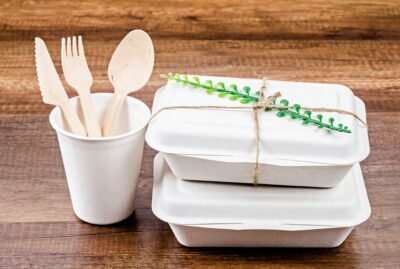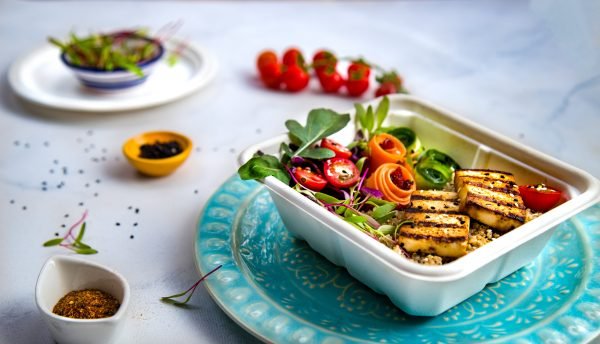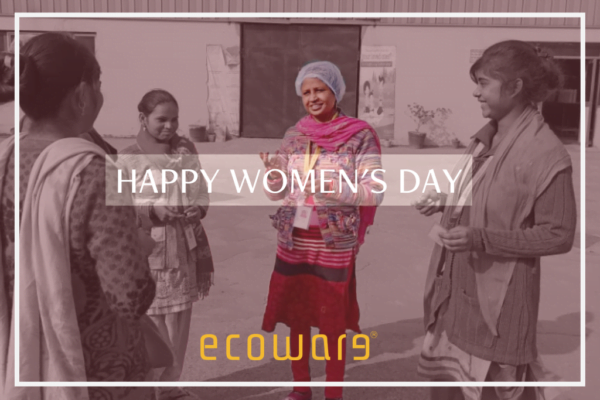As a part of my series about “Big Ideas That Might Change The World In The Next Few Years” I had the pleasure of interviewing Rhea Singhal. Rhea is a World Economic Forum Young Global Leader and Founder and CEO of Ecoware, India’s first and largest sustainable packaging company. Rhea was previously a senior sales executive in the Oncology team at Pfizer UK, and after moving to India, Rhea founded Ecoware with the sole aim of fixing India’s plastic menace. and single-use plastic? Ecoware disrupted the food packing industry by introducing a fully compostable alternative to single-use plastic and styrofoam.
Ecoware is made from the waste of common agricultural crops that would otherwise be burnt in the open, contributing to severe air pollution.
One of her greatest successes has been convincing the Indian Railways, the largest foodservice operator in India, to switch to biodegradables.
Rhea has been featured in various publications — Forbes, Hindustan Times, Economic Times, India Today and CNBC. She is a recognized leader in a number of fields ranging from Circular Economy and Sustainable Packaging to Climate Change. As a mother to two young children, Rhea knows first-hand the harmful impact of pollution on the most vulnerable. This is her constant motivation to do better.
Thank you so much for joining us! Can you tell us a story about what brought you to this specific career path?
My mother has had breast cancer twice. I started understanding the harmful effects of plastic from a very young age, I then went on to study Pharmacology, and I worked at Pfizer for five years specifically in their Oncology Team. This deepened my understanding of how toxins get into your body and cause cellular changes that lead to disease.
Can you share the most interesting story that happened to you since you began your career?
I don’t think there’s one specific story. The entire journey has been interesting to say the least. I grew up between Dubai & London, & in 2009 I left my cushy job at Pfizer UK and moved to Delhi at the age of 27. Never having lived in India nor having any experience as an entrepreneur, I’ve built a life and a business here. I now have two kids who are 5 & 7, my team at Ecoware is over 100 people.
Can you tell us about your “Big Idea That Might Change The World”?
Ecoware is India’s first and largest sustainable food packaging company. Ecoware uses common agricultural crop waste and converts it into the packaging. We aim to replace all single-use plastics with plant-based equivalents. Our objective is in sync with the UN Development Program (UNDP) Sustainable Development Goal (SDG) #12 — Responsible consumption and production.
Single-use plastics, often also referred to as disposable plastics, are commonly used for plastic packaging and include items intended to be used only once before they are thrown away or recycled. These include, among other items, grocery bags, food packaging, bottles, straws, containers, cups, and cutlery. The world produces more than 400 million tons of plastics every year, of which the largest industrial sector is plastic packaging (36%), single-use material designed for immediate disposal (Source: Geyer, Jambeck, and Law 2017).
India is biomass rich, and our process is ingenious in its use of annually renewable crops whose waste would otherwise be burnt (contributing to air pollution). Ecoware is natural oil and waterproof and can be microwaved safely up to 140 degrees Celsius and frozen up to — 20 degrees Celsius. Our solution is simple, effective and affordable.
How do you think this will change the world?
Ecoware provides a sustainable and affordable alternative to plastic and foam disposables that have collectively caused untold damage to the environment and adversely impact human health. Ecoware also efficiently uses agricultural waste that is normally disposed of by burning in the open. Pollution in major north Indian cities during October and November is primarily blamed on unchecked stubble burning.
India does not have a culture of waste management. Of the 62 million tons of waste produced in 2015, nearly 50% was dumped in landfills without treatment (Central Pollution Control Board). Plastic disposables constitute the majority of this non-treated waste by virtue of being cheap and commonplace. Faced with this predicament, I entered the market in 2009 to change peoples’ mindsets and challenge plastic’s monopoly.
Ecoware is a like-for-like replacement of single-use plastic products. It is affordable, available everywhere and exhibits the same or better properties. While there were biodegradable options before Ecoware in the market, none offered the complete package. Some materials are seasonal, others limited to certain geographies or have shortcomings in their usages (not suitable in Microwaves, not oil resistant). Ecoware was truly the first all-India solution that could cater to any food type.
Was there a “tipping point” that led you to this idea? Can you tell us that story?
Plastic pollution has become one of our planet’s greatest environmental threats. According to the UN, Plastic packaging accounts for nearly half of all plastic waste globally, and much of it is thrown away within just a few minutes of its first use. Much plastic may be single-use, but that does not mean it is easily disposable.
When discarded in landfills or the environment, plastic can take up to a thousand years to decompose. Alarmingly, plastics are now entering our food systems. The World Economic Forum reckons that by 2050 there will be more plastic than fish in the world’s oceans.
I founded Ecoware ten years ago to confront the plastic problem head-on. I make and sell 100% biodegradable and compostable packaging that negates the need for single-use plastics. Made from the waste of common agricultural crops, Ecoware has disposable tableware, packaging and medical-care products that offer an affordable and sustainable alternative.
While India is our primary market, our model can easily be replicated anywhere, especially in poor yet, biomass rich countries. My goal is to create a plastic-free world by raising public awareness and offering an affordable alternative to consumers, rather than just waiting for regulation to be enforced.
What do you need to lead this idea to widespread adoption?
Awareness. Externally, we are working with the Government to introduce zero taxes on biodegradable products and increasing taxes on unsustainable products to mitigate their negative impact. Together with partners in food services, we are encouraging the government to introduce labeling requirements to enable consumers to judge the sustainability of the products they buy. We are always engaged with customers through education programs, workshops, sampling sessions where the harmful effects of plastics on health are highlighted.
What are your “5 Things I Wish Someone Told Me Before I Started” and why? (Please share a story or example for each.)
Honestly, nothing.
I entered the entrepreneurial space with a completely open mind. Which is what I feel has helped me embrace and overcome challenges, and I think that’s why I learned what I have and I’ve enjoyed every bit of it. My journey hasn’t been influenced by anyone else’s thoughts.
Based on the future trends in your industry, if you had a million dollars, what would you invest in?
We have been 100% bootstrapped to date. For any disruptive business to go from proof-of-concept to profitability has to demonstrate “skin in the game.” We were the first company to introduce biodegradable food packaging to India. We were the first to manufacture locally in India. We were the first to convince food majors all the way from Subway to The Indian Railways to chuck plastic and move to sustainable alternatives.
Therefore we invested our equity and created a market from scratch. Now that we have reached a significant scale and since demand outstrips demand by 4x, we need another injection of funds. So yes, at this point we are keenly searching for investors who can provide capital but also mentorship and guidance to make Ecoware an RS. 100 people company in 3 years. The funds will be allocated towards increasing capacity at the current plant, increase sales and marketing visibility pan-India, new product development and enterprise-related technologies.
Our short-term goal is to take Ecoware pan-India so that we can permanently defeat single-use plastic. Very often we hear that customers in smaller cities are not aware of alternatives to plastic. With targeted marketing, deeper rural penetration and increased capacity we are confident of achieving this objective. Secondly, we wish to increase our scope of zero waste.
Currently, we use sugarcane pulp and wheat straw as raw materials as they are easy to procure, however, the goal is to consume rice straw and bamboo waste whose burning is the largest source of air pollution. Longer-term we plan to enter into new applications, such as medical care disposables. Hospitals use plastic or stainless receptacles for collecting biomedical waste. After each use, this needs to be sterilized. By using an eco-friendly “use and throw” we can reduce cross-infection risks, lower costs and increase staff time on patient care rather than cleaning.
Which principles or philosophies have guided your life? Your career?
1. Accountability
2. Authenticity
3. Networking is about giving
4. Keep evolving
Can you share with our readers what you think are the most important “success habits” or “success mindsets”?
1. Take the time to stop, reflect, reset and move on. Your inner game runs your outer game
2. Accept that change is the most constant part of lives
3. Focus on what you can control.
4. Be present, mentally, emotionally and physically.
Some very well known VCs read this column. If you had 60 seconds to make a pitch to a VC, what would you say?
Ecoware is India’s first and largest sustainable packaging company that is fighting against plastic pollution. Our products are 100% natural and compostable, and we are easily scalable. Solutions such as ours are the future.
How can our readers follow you on social media?
Facebook: https://www.facebook.com/ecowareindia/
Twitter: @ecowareindia
Instagram: @ecowareindia
Source: Authority Magazine on Medium





